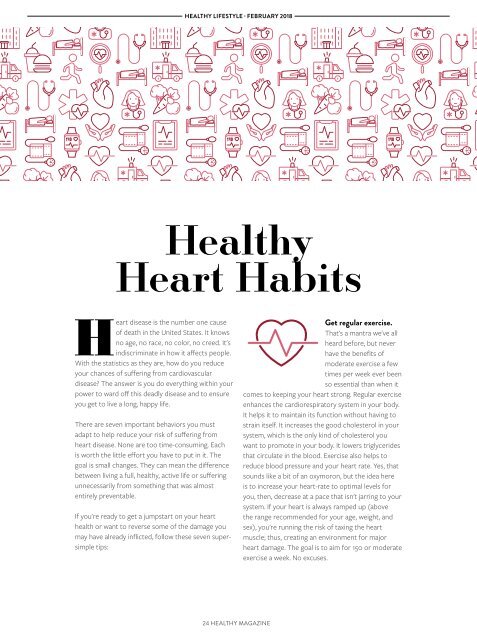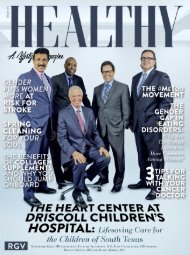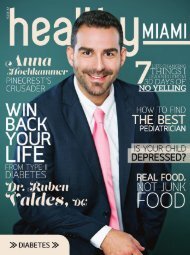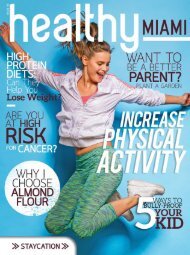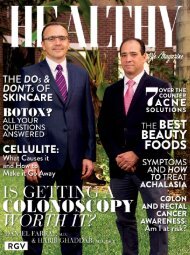Healthy RGV Issue 111- It's in Your Blood, What You Should Know About Hematology and Blood Disorders
You also want an ePaper? Increase the reach of your titles
YUMPU automatically turns print PDFs into web optimized ePapers that Google loves.
HEALTHY LIFESTYLE · FEBRUARY 2018<br />
<strong>Healthy</strong><br />
Heart Habits<br />
Heart disease is the number one cause<br />
of death <strong>in</strong> the United States. It knows<br />
no age, no race, no color, no creed. <strong>It's</strong><br />
<strong>in</strong>discrim<strong>in</strong>ate <strong>in</strong> how it affects people.<br />
With the statistics as they are, how do you reduce<br />
your chances of suffer<strong>in</strong>g from cardiovascular<br />
disease? The answer is you do everyth<strong>in</strong>g with<strong>in</strong> your<br />
power to ward off this deadly disease <strong>and</strong> to ensure<br />
you get to live a long, happy life.<br />
There are seven important behaviors you must<br />
adapt to help reduce your risk of suffer<strong>in</strong>g from<br />
heart disease. None are too time-consum<strong>in</strong>g. Each<br />
is worth the little effort you have to put <strong>in</strong> it. The<br />
goal is small changes. They can mean the difference<br />
between liv<strong>in</strong>g a full, healthy, active life or suffer<strong>in</strong>g<br />
unnecessarily from someth<strong>in</strong>g that was almost<br />
entirely preventable.<br />
If you're ready to get a jumpstart on your heart<br />
health or want to reverse some of the damage you<br />
may have already <strong>in</strong>flicted, follow these seven supersimple<br />
tips:<br />
Get regular exercise.<br />
That's a mantra we've all<br />
heard before, but never<br />
have the benefits of<br />
moderate exercise a few<br />
times per week ever been<br />
so essential than when it<br />
comes to keep<strong>in</strong>g your heart strong. Regular exercise<br />
enhances the cardiorespiratory system <strong>in</strong> your body.<br />
It helps it to ma<strong>in</strong>ta<strong>in</strong> its function without hav<strong>in</strong>g to<br />
stra<strong>in</strong> itself. It <strong>in</strong>creases the good cholesterol <strong>in</strong> your<br />
system, which is the only k<strong>in</strong>d of cholesterol you<br />
want to promote <strong>in</strong> your body. It lowers triglycerides<br />
that circulate <strong>in</strong> the blood. Exercise also helps to<br />
reduce blood pressure <strong>and</strong> your heart rate. Yes, that<br />
sounds like a bit of an oxymoron, but the idea here<br />
is to <strong>in</strong>crease your heart-rate to optimal levels for<br />
you, then, decrease at a pace that isn't jarr<strong>in</strong>g to your<br />
system. If your heart is always ramped up (above<br />
the range recommended for your age, weight, <strong>and</strong><br />
sex), you're runn<strong>in</strong>g the risk of tax<strong>in</strong>g the heart<br />
muscle; thus, creat<strong>in</strong>g an environment for major<br />
heart damage. The goal is to aim for 150 or moderate<br />
exercise a week. No excuses.<br />
24 HEALTHY MAGAZINE


